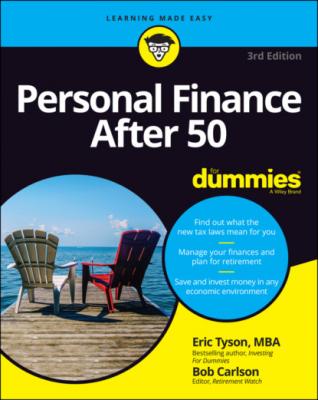Personal Finance After 50 For Dummies. Eric Tyson
Читать онлайн.| Название | Personal Finance After 50 For Dummies |
|---|---|
| Автор произведения | Eric Tyson |
| Жанр | Личные финансы |
| Серия | |
| Издательство | Личные финансы |
| Год выпуска | 0 |
| isbn | 9781119724087 |
299 304
300 305
301 306
302 307
303 308
304 309
305 310
306 311
307 312
308 313
309 314
310 315
311 316
312 317
313 318
314 319
315 320
316 321
317 323
318 324
319 325
320 326
321 327
322 328
323 329
324 330
325 331
326 332
327 333
328 334
329 335
330 336
331 337
332 338
333 339
334 340
335 341
336 342
337 343
338 344
339 345
340 347
341 348
342 349
343 350
344 351
345 352
346 353
347 354
348 355
349 356
350 357
351 358
352 359
353 360
354 361
355 362
356 363
357 364
358 365
359 366
360 367
361 368
362 369
363 370
364 371
365 372
366 373
367 374
368 375
369 376
370 377
371 378
372 379
373 380
374 381
Introduction
Some things get better with age. Aging presents opportunities for increased wisdom and broader perspective as well as some increased challenges. One of those challenges has to do with finances. The new, and sometimes more complex, financial decisions that confront folks in their later working years and then in retirement can be tough to work through.
For example, consider the types of questions we, your humble authors, have been asked from folks in our advisory businesses:
Can we afford to change careers, cut back on work, or simply retire? How much can we comfortably spend per year given our assets? Should I plan to move to an area with a lower cost of living?
My employer is offering me pension options. How do I choose among them?
I just left my employer (by choice or through layoff) and have some money in a retirement account. What should I do with it?
How should I manage my investments now and in the years ahead? When should I begin collecting Social Security benefits?
What’s the process for withdrawing money from my retirement accounts, and how can I minimize my tax hit from doing this?
Should I buy an annuity? If so, what type? Are reverse mortgages a good idea?
What types of additional medical insurance — long-term care insurance, Medicare supplement, and so on — do I need pre- and post-retirement?
An agent is telling me to buy more and different types of life insurance. How much do I need and what type of life insurance should I buy?
Do I need a will? Do I need an estate plan? Should I move to a more tax-favorable state? What should I do to protect my spouse, children, or significant others?
We wrote this book to answer these important questions and many more. We hope to not only answer your questions but to also make you aware of important issues you may not be aware of so you have plenty of time to consider them and make decisions that enhance your financial independence.
About This Book
Everyone needs to make financial decisions. Whether you’re rich, middle class, or poor; 50 or 85 years old; retired or still working two jobs, money passes through your hands every day. No matter your situation, we’re excellently positioned to give you sound financial advice on the range of issues presented in this book. We each have decades of professional experience in the financial services industry; we each have extensive training and background to provide expert personal financial and retirement advice; and we both communicate in plain English with our readers, operate free of conflicts of interest, and interact with people like you with real financial problems that need solutions.
Eric started as a management consultant in the financial services industry and then worked as a personal financial counselor. Now he’s an author and the proprietor of www.erictyson.com. Eric is a trained economist who graduated with honors in economics and biology from Yale University and got his MBA at Stanford. Bob is chairman of the board of trustees of the Fairfax County Employees’ Retirement System, which has more than $4 billion in assets. He has served on the board since 1992. He’s also the editor of the monthly newsletter Retirement Watch. Bob received his JD and an MS in accounting from the University of Virginia, received his BS in financial management from Clemson University, and passed the CPA exam.
We also
